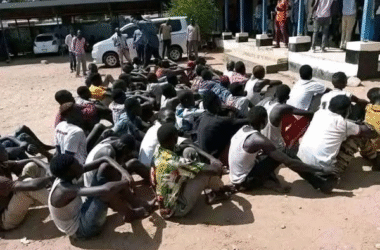By Kei Emmanuel Duku
Community leaders from Kajo-Keji County paid a courtesy visit to the newly appointed Central Equatoria State governor, Lt. Gen. Rabi Emmanuel Mujung, on Friday.
During the meeting, the leaders appealed for the governor’s intervention to tackle series of challenges, that the county faces, particularly insecurity.
The delegation, led by Hon. Agrey Tisa Sabuni, Chairperson of Kajo-Keji Community Organization, presented a list of key issues affecting the county.
Governor Mujung, in turn, expressed his gratitude for the visit and reaffirmed the State Government’s commitment to working with the community leaders.
He emphasized ongoing plans to restore peace and stability and called for unity among the people of Kajo-Keji and the entire state.
Sabuni underscored the deep respect Kajo-Keji leadership holds for the governor.
“As a community, we all know you very well and hold you in high regard,” he stated. He added, “We pledge our full support, cooperation, and staunch dedication to your leadership of Central Equatoria State.” Sabuni said.
The Chairperson of the Kajo-Keji Community Development Organization (KKCO) further highlighted the strong character of the Kajo-Keji people.
“Our community is known for its strong sense of right and wrong, translated into action through hard work, self-help, integrity, honesty, and fairness. These values will guide our collaboration with your administration as we work together with fellow communities across Central Equatoria.” Said the chairperson.
Some of critical issues the community highlighted include poor roads that have cut Kajo-Keji off from the rest of the country, like the capital city, Juba.
Kaji-Keji’s isolation due to poor roads has severely affected access to services and economic activities, hindering development and progress.
The delegation also noted that a significant number of Kajo-Keji residents remain in refugee camps in Uganda due to persistent insecurity on the ground.
They attribute elements of National Salvation Front (NAS), SPLA-IO, and armed cattle herders, as main sources of the insecurity.
The ongoing security threats have made delivery of essential services—such as healthcare, education, and access to clean drinking water—virtually impossible for those who still reside in the county.




